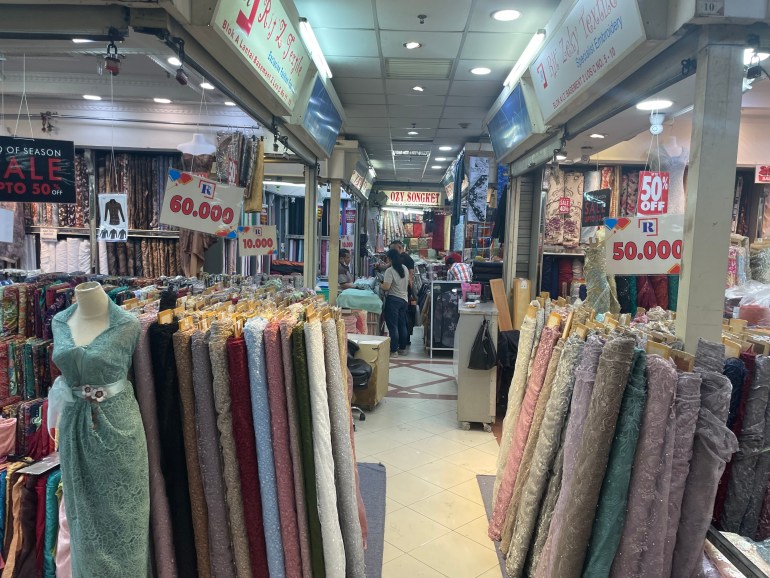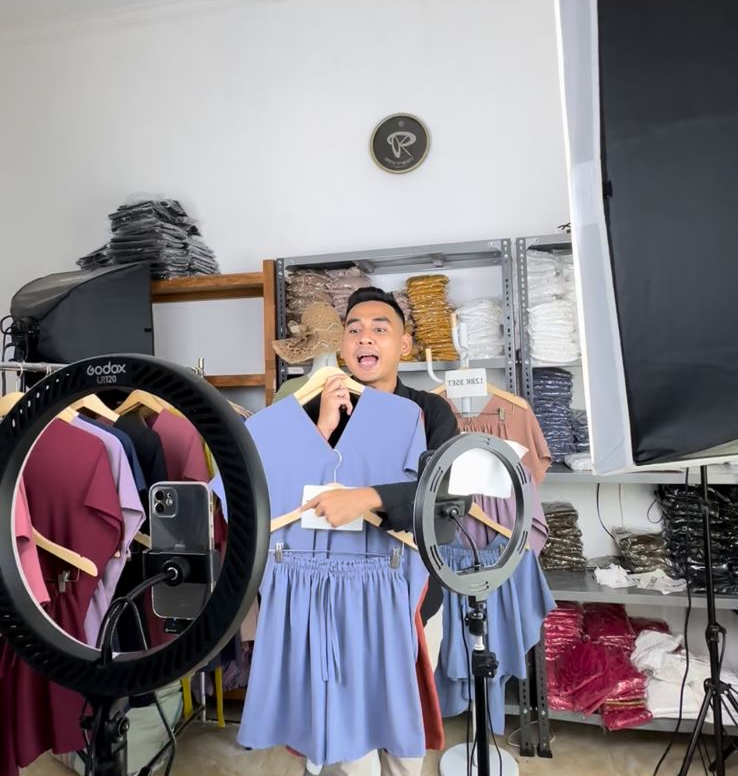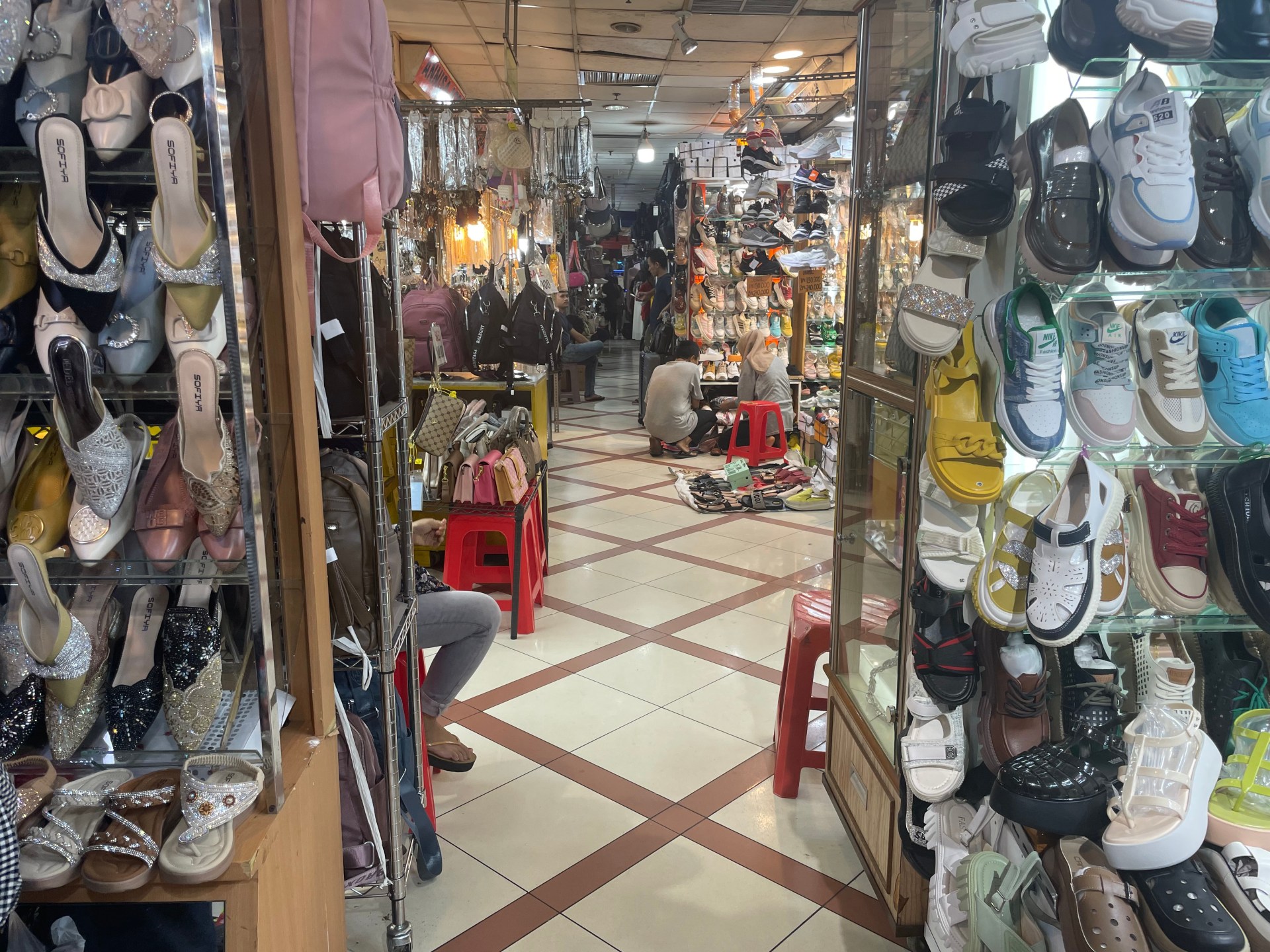Jakarta, Indonesia – Tanah Abang is the most significant textile and apparel sector in Southeast Asia, very well-identified among the traders all all-around Asia and as far as Africa. But business enterprise these days is not very good, with foot traffic down by half in comparison with prior to the pandemic.
In accordance to stallholders at the almost 300-year-old market place in Central Jakarta, TikTok Shop, the e-commerce function of the world’s most well-liked video clip-sharing application, is squarely to blame.
“TikTok is genuinely lousy for my organization,” Hairun Nisa, whose family members have marketed men’s casual clothes at Tanah Abang for 20 decades, explained to Al Jazeera.
“It’s different to other forms of e-commerce due to the fact, in TikTok, people today market their products and solutions making use of video clip and can interact with consumers in real-time.”
“It’s not like the outdated days when this sector was constantly crowded,” extra Roni Waskito, who has marketed sneakers at Tanag Abang since 2010 and who also blames TikTok for the drop in trade.

TikTok Shop amassed 6 million sellers in Indonesia within a year of its launch in 2021 and last year captured about 5 % of Indonesia’s booming $52bn e-commerce.
The e-commerce platform had been on goal to raise gross sales by about 350 per cent this yr, in accordance to Singapore investigation company Momentum Functions – right until the Indonesian govt banned it on October 5.
Jakarta has justified the ban as necessary to guard the country’s 64 million micro, small and medium enterprises (MSMEs), together with merchants at marketplaces these types of as Tanah Abang.
Indonesian Trade Minister Zulkifli Hasan has accused the system of facilitating predatory pricing techniques and an influx of inexpensive imported products as effectively as not getting in compliance with the regulation.
“Transactions are not authorized on social media. Like television, social media is only for marketing,” Hasan informed neighborhood media through a new check out to Tanah Abang
The ban in Indonesia, in which TikTok has 125 million end users – much more than any state aside from the United States – is just the newest in a series of setbacks for the application.
The US, the United Kingdom, Canada, Australia, New Zealand, Taiwan and several European Union nations have banned the app on federal government products more than considerations that its Chinese owner ByteDance could share delicate consumer facts like geolocation with Beijing to further its armed service and political ambitions.
India outright banned TikTok in 2020 over very similar stability fears, although Pakistan and Afghanistan cited worries about “immoral” content when they banned the app.
TikTok declined an prospect to comment on the Indonesian ban, saying only that it has complied with the legislation.

Some of the believed 6 million sellers who earlier attained a residing by means of TikTok Shop have been significantly less restrained in their reaction.
“We are quite unhappy because the federal government closed our TikTok Store and our sales dropped to pretty much nothing,” Evo Syah, the founder of Videlin Formal, a women’s clothing brand name based mostly in Bali, explained to Al Jazeera.
“Previously, we experienced at the very least 200 product sales for each day. Now we have 10 or 20 using [Singaporean e-commerce portal] Shopee. For the moment, I will check out to hold my staff members I have 10 whole-time team. But if factors carry on like this, I could have to make a rough final decision and let them go. The govt really should listen to our voice.”
Golda Pradeksa, the founder of Alya the Label, a Bali-primarily based women’s outfits retailer that marketed completely on TikTok, said that whilst she felt sorry for classic retailers who misplaced business enterprise, banning the platform was not the respond to.
“I am definitely disappointed due to the fact now I have to redo all my articles and go to Shopee and I never know if it will perform due to the fact Shopee doesn’t have the identical interactivity in between sellers and buyers as TikTok,” Pradeksa advised Al Jazeera.
“The retail environment is evolving every single day,” she additional.
“Store homeowners require to catch up with the changes or get remaining guiding. But there’s no purpose they just cannot have both offline and on-line merchants for the reason that it provides them the skill to sell not only domestically, but globally. It’s particularly what I do. I promote Videlin on the net and my initially style label from a storefront in Bali.”
Numerous stallholders at Tanah Abang ended up presently mixing offline and online gross sales in advance of the ban, according to Fithra Faisal Hastiadi, a previous spokesperson for the Ministry of Trade and an independent economist who is hugely crucial of the ban.
“It was the improper move,” Hastiadi informed Al Jazeera. “The government argues TikTok’s model – social media merged with e-commerce – has been the important disruptor at regular marketplaces like Tanah Abang. But that is not totally accurate.”
Hastiadi stated the fall in business at markets like Tanah Abang is the final result of low- and center-revenue earners’ minimized investing electric power and a drop in wholesale prospective buyers from Africa as effectively as other elements of Asia because the COVID-19 pandemic.
Arguments that inexpensive Chinese products are all of a sudden displacing nearby goods are disingenuous, he said, due to the fact Chinese solutions have been flooding into Indonesia for a lot more than a ten years.
When it arrives to e-commerce, Hastiadi claimed that platforms like Shopee and Indonesia’s equal Tokopedia have performed much more to disrupt conventional markets than TikTok.
He explained TikTok Shop’s rivals experienced probably lobbied the Indonesian authorities to ban the system, which experienced swiftly encroached on their market share since it entered the market.
“In economics, we have theories to help us have an understanding of the motives of actors,” he reported. “The tendency exposed through former eventualities displays all those getting disrupted test to convince the powers that be to ban or restrict the disruptors.”

When contacted by Al Jazeera, Shopee and Tokopedia did not affirm or deny that they lobbied the Indonesian governing administration to ban TikTok Shop.
When Al Jazeera frequented Tanah Abang a 7 days after the ban, sellers did not report considerably of an improvement in human targeted traffic or revenue.
“Things have gotten slightly better. But however not as great as they employed to be,” shoe salesman Waskito advised Al Jazeera.
“I haven’t noticed any change but I consider it is as well early to inform, ” extra menswear seller Nisa. “But ideally points are going to get far better for us quickly.”

